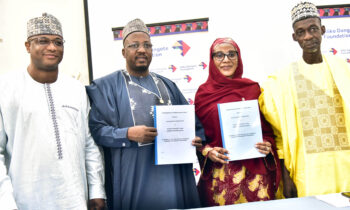
Olusola Bello
The Governor of the Central Bank of Nigeria (CBN), Godwin Emefiele, has said the central bank had disbursed over N83.9 billion to pharmaceutical and healthcare practitioners in the country since the outbreak of the COVID-19 pandemic in the country.
He stated this at the premier of ‘Unmasked’, a documentary on Nigeria’s response to the pandemic held in Lagos.
The Central Bank Governor said: “Building a robust healthcare infrastructure was also vital from a security perspective, as some nations had imposed restrictions on the exports of vital medical drugs as well as the use of drug patents that could aid in containing the spread of the pandemic.”
He said because of this, the apex bank focused its interventions in the healthcare sector on three areas. Building the capacity of our healthcare institutions supporting the domestic manufacturing of drugs by businesses, and providing grants to researchers in the medical field, in order to encourage them to develop breakthrough innovations that would address health challenges faced by Nigerians.
“In this regard we disbursed over N83.9 billion in loans to pharmaceutical companies and healthcare practitioners, which is supporting 26 pharmaceutical and 56 medical projects across the country. We were also able to mobilise key stakeholders in the Nigerian economy through the CACOVID alliance, which led to the provision of over N25 billion in relief materials to affected households, and the set-up of 39 isolation centres across the country. These measures helped to expand and strengthen the capacity of our healthcare institutions to respond to the COVID-19 pandemic.”
The CBN boss also disclosed that the bank also initiated the Healthcare Sector Research and Development Intervention Grant Scheme, which was to aid research on solutions that could address diseases such as COVID-19, and other communicable/non-communicable diseases.
He said so far, five major healthcare-related research projects were being financed under the initiative.
Speaking on the call to increase access to health insurance, he said: “One key aspect which we would have to address is improving access to healthcare for all Nigerians. A key factor that has impeded access to healthcare for Nigerians is the prevailing cost of healthcare services.
“According to a study by World Health Organisation (WHO), only four per cent of Nigerians have access to health insurance. Besides food, healthcare expenses are a significant component of the average Nigeria’s personal expenditure.
“Out of pocket expenses on healthcare amount to close to 76 per cent of total healthcare expenditure. At such levels of health spending, individuals particularly those in rural communities may be denied access to healthcare services.
“Expanding the insurance net to capture the pool of Nigerians not covered by existing health insurance schemes, could help to reduce the high out of pocket expenses on healthcare services by Nigerians. It will also help to increase the pool of funds that could be invested in building our healthcare infrastructure and in improving the existing welfare package of our healthcare workers.”





